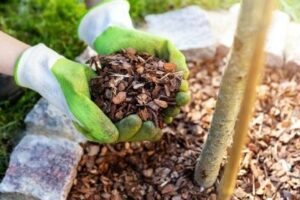It is a landscape treatment that catches the eye and adds a clean, finishing touch to any outdoor space, but beyond aesthetics, there are a number of important lawn care reasons why you would want to consider adding mulch in your yard.
Mulching happens all around us naturally when the leaves and needles from trees and plants fall off and form a layer of organic matter around the roots, which helps reduce or eliminate soil erosion. This layer also acts as insulation for the root system, keeping severe heat and cold out, moisture in, and feeds plants much-needed organic nourishment. 
This is what you’re doing when you or an independent landscaper lays down mulch in your garden and flower beds, around trees and shrubs, and as pretty-looking borders to your lawn.
One huge benefit you cannot see directly is that mulch improves your soil’s ability to hold water and its nutrient supply. It also aids in the development of root growth, especially in early spring because mulch helps to warm soil faster.
Many homeowners already know that mulch discourages weeds from taking over a garden or around trees and plants, as well as grass where you don’t want it to grow, but you may not know that research has found that a well-mulched garden can yield up to 50-percent more vegetables compared to an un-mulched garden of the same size. With mulch, you can space rows closer together because there is little need to cultivate the soil.
It also protects delicate flowers and leafy plants from being damaged by errant weed eaters and lawn mowers.
What’s in mulch?
There are two categories for mulch: organic and inorganic. And there many different types of each.
 Probably the most common organic mulches are tree bark, wood chips, and pine straw (also known as pine needles.) Tree bark is a popular choice because it is resistant to decomposition. Pine straw is well-liked because it won’t compact soil and it gives your landscape a natural look.
Probably the most common organic mulches are tree bark, wood chips, and pine straw (also known as pine needles.) Tree bark is a popular choice because it is resistant to decomposition. Pine straw is well-liked because it won’t compact soil and it gives your landscape a natural look.
Organic mulch is applied at least once every growing season.
If you’re buying it yourself or ordering it from an independent landscaper, ask for “virgin mulch,” which means it comes directly from wood fibers that are ground up, from tree bark, and from leaves. It will not contain pieces of old wood cabinets or similar furniture, discarded refuse from landscape projects, and the like.
One note about pine straw as a mulch: pine needles add to the acidity of soil. A landscape expert can do a soil test to help you determine whether pine straw is an ideal option for you.
Inorganic mulch, as the name implies, does not come from any plant-based material. This kind of mulch include things like crushed stone and gravel. These types of mulches make a landscape pop.

